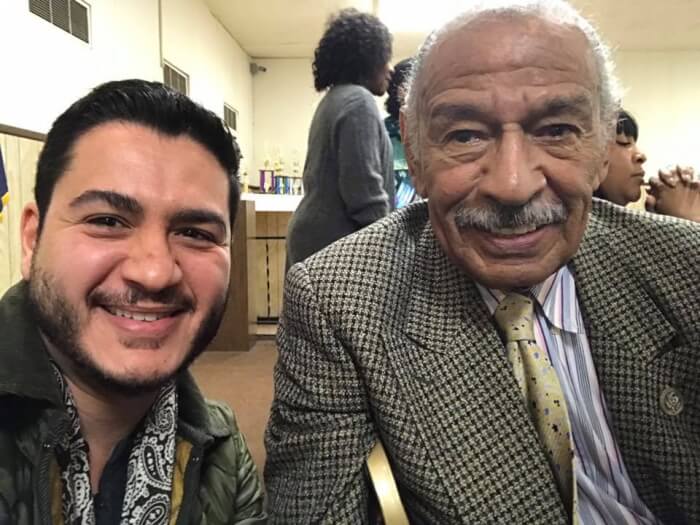Tlaib slips through Black divide to win Congressional seat
Rashida Tlaib was able to win the office for U.S. Congress in Michigan’s 13th District in a large part because of support from activists like filmmaker Michael Moore and allies of Bernie Sanders, but mainly because her African American rivals split the Black vote decisively reducing their strength. We know this because there were two different races for the 13 District, one for the full two-year term with six candidates that Tlaib won, and one for the remaining term of two months, which had only had four candidates
By Ray Hanania
The sharp divisions in the Black vote in Michigan’s 13th Congressional District opened the door for the election of the first Palestinian Arab Muslim woman to the U.S. Congress.
The reason we know this is true is because the election for the 13th Congressional District was actually done in two different election contests both held at the same time on August 7, 2018 in the Democratic Primary. In one race that Tlaib lost, there were only two African American rivals. In the race that Tlaib won, there were four African American and one White rivals.
A vacancy was created in the 13th Congressional seat when longtime Congressman John Conyers Jr., was forced to resign the seat in the wake of sexual harassment accusations. Conyers represented the overwhelming African American district for an unprecedented 52 years from 1967 until 2017, when he resigned. Conyers was considered the “Dean” of the U.S. Congress.
That resignation resulted in the need to hold two concurrent elections, one to fill the vacancy through the end of Conyer’s remaining two months in office, and another to elect a successor to represent the district in the subsequent two-year term from January 2019 through the next elections in November 2020.
While there were six candidates running for the full two-year term beginning in January 2019, that Tlaib won, there were only four candidates running in the contest to complete the current term, serving only two months, that Tlaib lost.

Detroit City Council President Brenda Jones, who is African American, won the contest to fill the remaining two months of Conyer’s current term, against three rivals, while Rashida Tlaib, who is Arab American, won the election to be Conyer’s successor, against five rivals, filling the next two years beginning with the swearing in sometime in January 2019 and remaining in office until the end of that term in January 2021. (The next primary will be in August 2020 and the next general election will be in November 2020)
The difference between the two contests was stark. In the race that Jones won, there were only four candidates. Jones defeated Tlaib by a decisive vote of 32,727 votes (37 percent) to 31,084 (35 percent of the vote). The two other candidates in that four-person contest were Bill Wild, who is white and received only 13,152 votes (15 percent), and African American Ian Conyers, who is a nephew of John Conyers but received only 9,740 votes (11 percent).
But in the more significant contest to succeed Conyers serving two full years in a new term, there were two additional candidates in the race, both African American. The vote results were far different when six candidates vyed for votes and four of them are Black.
The two additional African American candidates, Coleman Young Jr., the son of the former Detroit Mayor, and Shanelle Jackson drew more than 16,000 votes away from Jones, presumably African American voters. Young received 11,162 votes (12 percent) and Jackson received 4,848 votes (5 percent).

Both Tlaib and Jones lost votes to the additional candidates, and Tlaib only received 27,803 (31 percent) and Jones received only 26,916 (30 percent). Jones lost to Tlaib by only 887 votes.
In the less significant contest filling Conyer’s remaining two months, Jones defeated Tlaib by 1,643 votes.
Westland Mayor Bill Wild received almost the same vote in both elections, 13,152 votes (15 percent) in the four-person two-year term race, and only slightly less of 12,589 votes (14 percent), a difference of only 563 votes.
Had Coleman and Jackson qualified for the full-term race, Tlaib would not have won based on Jones’ performance in the other contest.
Splitting an ethnic vote is a phenomena in urban communities with large Black and Hispanic voters, including in Chicago where it actually benefit the Black community in 1983 when Harold Washington, a Black former Illinois legislator, defeated an incumbent Mayor, Jane M. Byrne, and Richard M. Daley, who was the son of the city’s long-time mayor, Richard J. Daley. Both Byrne and Daley are white.
To hold the seta for more than one term, Tlaib will have to focus her energies on winning over the support of the district’s strong and active African American voter constituency. And, the Black community will have to field fewer challengers next time.
(Ray Hanania is an award-winning Palestinian American columnist and the author of several books including “Yalla! Fight Back.” His personal website is www.Hanania.com. Twitter: @RayHanania. His syndicated columns appear in the www.ArabNews.com.)


- Israelisnipers shooting and killing hospital workers in Gaza - December 11, 2023
- CAIR Condemns Israeli Executions of Wounded, Unarmed Palestinian in West Bank - December 11, 2023
- Arab and Muslim American voters face a “simple choice” between Biden’s inhumanity and Trump’s edgy politics - December 9, 2023























